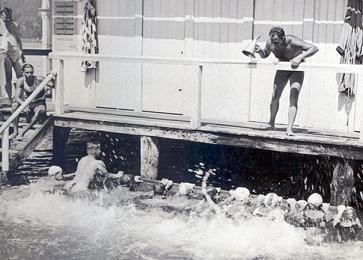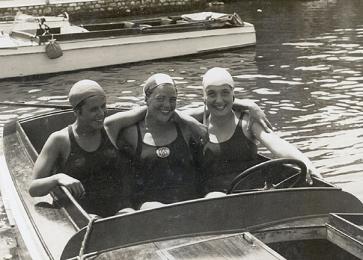Watermarks


Watermarks is the heartwarming story of the reunion of the Hakoah Vienna Swim Team, separated by the outbreak of World War II. Hakoah (Hebrew for 'strength') was a fitness club that catered to Jews, created primarily because they were not allowed to join other clubs. Director Yaron Zilberman points out that while Jews were known for their education and business acumen, Hakoah allowed them to showcase their physical strength, which lay outside the typical stereotypes. The Hakoah men's soccer team became the first to beat the English on their own soil, and the Hakoah women's swimming team, the subject of this film, set records across the world.
It is hard to grasp that some of these women have not seen each other for sixty years. Zilberman, who co-wrote the documentary with Ronen Dorfan and Yonatan Israel save the reunion for the end, and instead focus first on the history behind Hakoah and the individual swimmers. As World War II drew closer, it became increasingly dangerous for the Hakoah swimmers. Judith Haspel, the top female swimmer in Austria, was banned from competition and later stripped of her awards after failing to participate in the 1936 Berlin Olympics. Most of the team scattered across the world when war broke out, and Zilberman managed to track them down and convince them to reconvene for one final swim.
All of these women are just amazing, and it's inspiring to hear them speak at length about their lives. They have children and grandchildren, and live everywhere from the United States to England and Israel. Their memories of growing up in Austria were strong. For Elisheva Susz, her experiences with Hakoah led her to discover her own Jewish identity. Others, like Ann Marie Pisker, are still feisty - she insists that Zilberman not film her with her swimsuit outside the pool.
It's a shame that this documentary was not better. Zilberman stumbles on a few points. First, he decided to narrate. English is not his first language, and as the credits show, he needed a dialogue coach. His voiceover is a bit awkward, and unfortunately, a little distracting. More importantly is the running length. One assumes that Zilberman and his crew amassed a large amount of footage, but they still are not at a full feature length. He nearly ignores the scene when these women first see each other again after decades of separation, only letting a few minutes suffice to show this emotional moment. He also saves the pool shot for the very end. This is another highly emotion moment, and Zilberman overplays it with a few too many slow motion and wide angle shots, then really overdoes it with the cheesy music. Hopefully, Watermarks will arrive on DVD, with lots of additional footage.